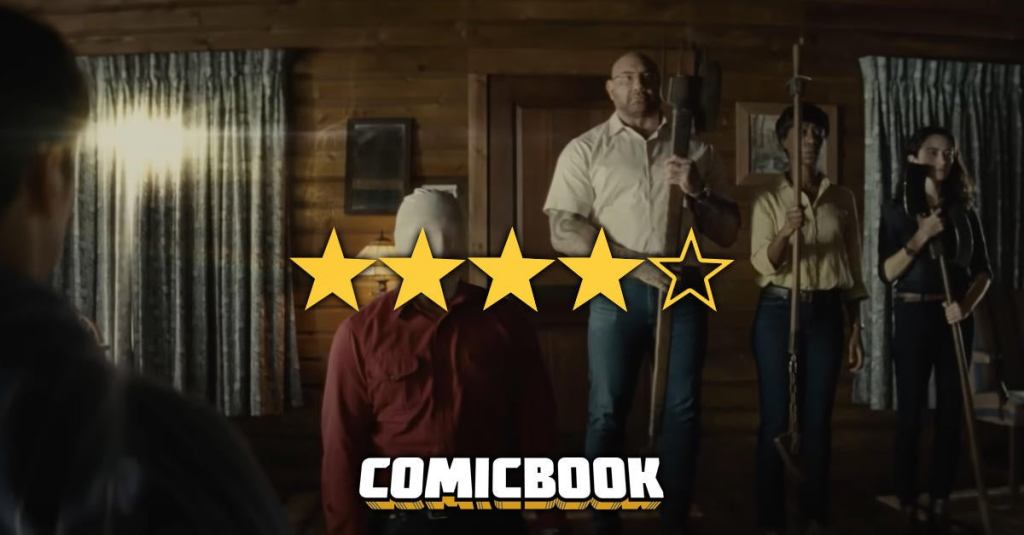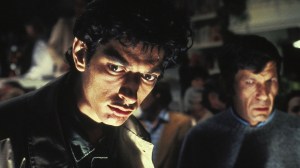Few contemporary filmmakers are as unpredictable as M. Night Shyamalan, not solely in the sense that his narratives explore uncharted territory, but the actual success of those adventures can never be anticipated. Over the last 25 years, he’s wowed audiences with projects like The Sixth Sense and Signs, yet also delivered definitive disappointments with projects like The Happening and The Last Airbender. Despite 2017’s Split showcasing just how compelling of a filmmaker he can really be, he followed that with two certified clunkers in Glass and Old. Knock on the Cabin could have been a nail in the coffin of the late stages of his career, but by focusing on a contained premise, riveting performances, and ambiguously apocalyptic stakes, Shyamalan has proven once again that he has what it takes to deliver a thrilling journey into the minds of fanatics and those caught in the path of their fervor.
Videos by ComicBook.com
Led by the mild-mannered and unassuming Leonard (Dave Bautista), a group of strangers claims they have all had visions of a cabin in the woods that they are tasked with infiltrating in order to save the world. Not only must these figures make their way inside this home, they must also convince husbands Eric (Jonathan Groff) and Andrew (Ben Aldridge) and young daughter Wen (Kristen Cui) that they must make the decision to sacrifice a member of their family to prevent a world-ending threat.
Throughout his career, Shyamalan’s proven that his skills as a director far outshine his skills as a writer. While both his hits and misses are often original stories that he both writes and directs, it’s the features in which he shows more than he tells that work; once he starts to tip his narrative hand, he attempts to justify the outlandish events, exchanges, and mythology, forcing the audiences to take a look at the absurdity. With Knock on the Cabin being based on the Paul G. Tremblay novel The Cabin at the End of the World, some of the biggest obstacles the filmmaker usually faces are already established for him, with the film also seeing him enlist Steve Desmond and Michael Sherman to develop the screenplay. This makes for a premise that has tremendous potential, thanks to Tremblay’s source material, while the collaborative nature of the screenplay makes the experience a bit more even-keeled in not only dialogue, but also in how much mythology to showcase.
For the past four years, Shyamalan has served as a showrunner on the Apple TV+ series Servant, which largely unfolds in one family’s home. The filmmaker has clearly honed his skills of ratcheting up the tension and allowing it to dissipate in service of the story in the confines of one location, which is what really makes Knock at the Cabin succeed. In the first few minutes, Leonard calmly approaches the young Wen as she catches grasshoppers, with his massive physical stature in comparison to the young girl highlighting his strength and her vulnerability, instantly setting audiences on edge, even if Leonard doesn’t have to speak a word. From these first few minutes, viewers are put on edge and taken on a disturbing journey that commands your attention with every reveal.
Baked into the story, as well as the novel, is the deadline that the family faces, which also comes with members of this intruding group being forced to make sacrifices of their own at regular intervals if the family doesn’t make the decision of who to sacrifice. This gives the entire story a ticking-clock structure, so as soon as the tension of one situation dissipates, it immediately starts building and igniting investment from the viewer. Even if the film itself isn’t resonating with you, it’s hard to not invest in it enough to want to have your curiosity satiated about what’s really happening to these people.
All of Shyamalan’s films exist in a dimension that feels just lateral to ours, one that is tonally more amplified and exaggerated than not only the real world, but more than most other films. He doesn’t always succeed in getting his performers and their dialogue to find the balance between realism and absurdity, but in this case, it works. Whereas a film like Old delivers an entire group of characters who don’t understand the situation they find themselves in, each of them heightening their disbelief and exaggerating it off one another, Knock at the Cabin grounds its antagonists in a reality and allows the victims to deliver the astonishment and disbelief of the premise. Audiences will surely balk at some of the dialogue and reactions of the victims, but the conviction of the intruders helps cement some stability and an overall tone, and even though some of their actions are also absurd, the audience knows they’re operating under entirely bizarre motivations that justify that outlandishness. Bautista, in particular, delivers a captivating performance as a physically commanding character that never relies on his brutality to get his point across, instead internalizing the emotional pain of having to not only ask this family to make this sacrifice for the sake of the entire world, but also knowing the sacrifices he must make if he cannot convince them.
Especially over the last few years, the Internet has offered the opportunity for anyone with any fantastical and baseless ideas to connect with one another and justify these thoughts merely by finding any other person who shares those outlooks while ignoring all doubters and facts. The film doesn’t necessarily feel like it’s inspired by people who buy into hoaxes, any number of “truthers,” or religious fanaticism, yet the prevalence of such beliefs popping up on all corners of social media on a daily basis makes the premise all the more chilling and believable. For the intruders, they’ll do whatever it takes to find the evidence they can to prove that they are on a divine mission, united by premonitions of the End Times, while the family of victims can chalk up this seeming proof as correlation as opposed to causation. Right up to the ending, viewers will be left guessing about what’s really going on in this cabin and whether there was any merit to these apocalyptic visions, reminding us that the power of the story is more in the journey than in the destination.
With a number of Shyamalan’s films delivering an unexpected reveal in its conclusion, he’s earned a reputation that all of his films offer a “twist ending.” Sadly, this catch-all term has been used to describe the final act of just about any of his films, regardless of the severity of the shocking reveals in his endings, which some audiences might opt to call a “resolution” as opposed to a shocking twist. While the film might not feature a major shock that fundamentally alters the reality the film presented, there are definitely decisions made my characters that are disappointing and frustrating, ones that almost undercut the impact of the entire film leading up to that resolution. Even if that finale isn’t as gasp-inducing as other Shyamalan films, the conclusion of the experience will split audiences, potentially to the point of tainting the events that led up to that moment.
Knock at the Cabin delivers audiences a perplexing premise that feels all-too-real yet one that is just heightened enough to allow for some escapism, with its overall narrative structure making it easy to buy into the events and keep us invested until its conclusion. The intimate nature of the setting and engaging performances from a cohesive ensemble help sell the outlandishness of the concept, and even if the final outcome irritates audiences, those disappointed in the outcome are only capable of feeling those frustrations because you invested in the resolution so deeply and easily. The experience could have easily marked three disappointments in a row for Shyamalan, but he’s managed to bounce back strongly enough by embracing his narrative and directorial strengths that we’ll continue checking out the big swings that keep us on our toes instead of him resting on his laurels.
Rating: 4 out of 5

Knock at the Cabin lands in theaters on February 3rd.








